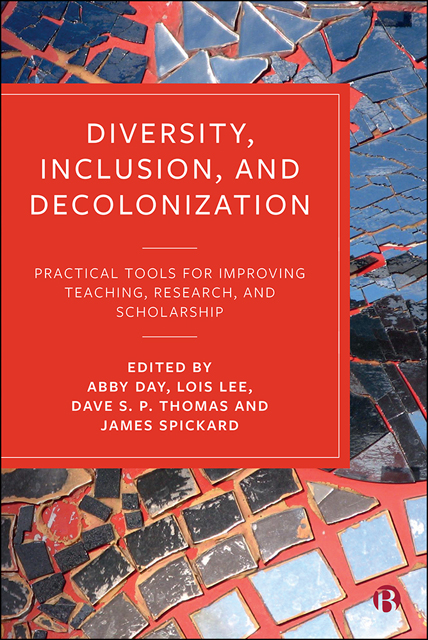 Diversity, Inclusion, and Decolonization
Diversity, Inclusion, and Decolonization Book contents
- Frontmatter
- Contents
- List of Figures and Tables
- Notes on Contributors
- Acknowledgements
- Typographical Note
- Introduction: Why Diversity, Inclusion, and Decolonization Matter
- Part I Changing Universities
- Part II Diversifying Curricula
- Part III Diversifying Research and Scholarship
- Part IV Overcoming Intellectual Colonialism
- Epilogue: What We Have Learned
- Index
5 - Emergent Tensions in Diversity and Inclusion Work in Universities: Reflections on Policy and Practice
Published online by Cambridge University Press: 13 October 2022
- Frontmatter
- Contents
- List of Figures and Tables
- Notes on Contributors
- Acknowledgements
- Typographical Note
- Introduction: Why Diversity, Inclusion, and Decolonization Matter
- Part I Changing Universities
- Part II Diversifying Curricula
- Part III Diversifying Research and Scholarship
- Part IV Overcoming Intellectual Colonialism
- Epilogue: What We Have Learned
- Index
Summary
Introduction
Amid growing population diversity, universities face the challenge of including historically under-represented students, staff, and faculty (Kobayashi, 2009; Tienda, 2013; Karakasoglu, 2014; Henry et al, 2017). While diversity can be mandated and is a precursor for inclusion, inclusion is a normative target stemming from voluntary action and requiring complex reorganization, which presents challenges for universities (Tienda, 2013). As Winters puts it, inclusion work involves ‘creating an environment that acknowledges, welcomes and accepts different approaches, styles, perspectives and experiences, so all can reach their potential and result in enhanced organizational success’ (Winters, 2014, p 206). This work demands answers to pressing questions: how do universities create an inclusive environment? How do we transform our institutions?
This chapter examines a collaborative workshop designed to mobilize knowledge about ‘doing diversity and inclusion’ that was organized jointly by the University of Guelph, Canada, and Bremen University, Germany, two institutions with a long-standing strategic partnership. The workshop brought together 50 students, staff, administrators, and faculty to share practical actions for better serving under-represented community members. The universities share societal positioning, size, and many research interests, as well as a commitment to changing university structures to foster inclusion. Over the course of the workshop, interesting insights emerged, including differences in priorities and histories, structure, and strategy, producing an opportunity for constructive and creative thinking about how to address shared and divergent aspects of inclusion.
The presentations and conversations that filled our two days together vividly described the lived experience of doing diversity and inclusion work. The workshop was designed to include people doing the work from different perspectives, holding different positions in relation to diversity and inclusion policies and practices. Participants ranged from those who are the objects of policies to those who set policy, enact it, advocate for it, work against policy, struggle with it, and work outside it. While the workshop was intended to generate a framework for creating sustainable inclusion strategies, and to identify and develop recommendations for policies and practices, it raised substantially more questions than answers and revealed tensions that emerge when doing diversity and inclusion work on university campuses. These tensions serve as the context in which students, staff, faculty, and administrators must work to advance inclusivity agendas.
- Type
- Chapter
- Information
- Diversity, Inclusion, and DecolonizationPractical Tools for Improving Teaching, Research, and Scholarship, pp. 81 - 94Publisher: Bristol University PressPrint publication year: 2022


